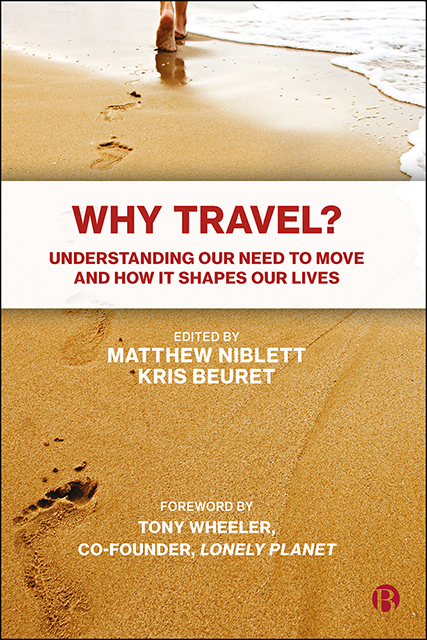Book contents
2 - Biological Perspectives on Travel
Published online by Cambridge University Press: 21 April 2023
Summary
As a species, humans are the world's great travellers. We have travelled to every continent on the planet, and even to the moon. On an individual level, over a billion people travel outside their own country every year. Every day most of us will make a journey of some sort, usually spending about an hour per day travelling, regardless of our country or culture of origin (Marchetti, 1994). It seems common sense that such a ubiquitous behaviour must have some sort of biological basis: that travel is in some way ‘hard-wired’ into us. Yet travel is so rarely considered this way: it is thought of as a waste of time, a ‘derived demand’, in economistspeak, to be minimized and insulated against. Such a view ignores the biological basis of our travel behaviour, and risks our wellbeing as well as that of the planet's other biological systems.
To explore this idea of ‘hard-wiring’, we must look beyond just the more obvious biological motivations for travel – those shared with all mobile organisms – like access to food, shelter or a mate. We must step outside our narrow view of the modern world and look back deep into our evolutionary past, and inside our brains and bodies. This chapter therefore begins its story six million years ago, to understand how ‘coming down from the trees’ changed our basic mode of travel and, with it, expanded our physical and mental horizons. The second part of the chapter turns our gaze inwards to try to understand the effects travel has on our bodies and brains. Bringing together research in diverse fields of biology, we will see how travel is implicated in physical, mental and cognitive health; how travel is processed in our brains; and even how travel might play a role in human social groups. In doing so we can better understand human travel – why we have travelled in the past and why we will continue to do so.
‘The travelling ape’ – travel and human evolution
When Tony Hiss, author of the next chapter (‘Travel and The Mind’), terms Homo sapiens the ‘travelling ape’, is this fanciful or do we really show a propensity to travel not exhibited by other primates? If we take a look back at our prehistory (rather than at the age of modern travel, when the odds seem so stacked in our favour), were humans such great travellers?
- Type
- Chapter
- Information
- Why Travel?Understanding Our Need to Move and How It Shapes Our Lives, pp. 13 - 32Publisher: Bristol University PressPrint publication year: 2021
- 1
- Cited by



